AIs can lie. These are referred to as ‘AI hallucinations,’ which occur when large language models, such as generative AI chatbots, detect and respond to patterns or objects that do not exist, leading to AI results that are nonsensical or inaccurate. Although AIs most often yield precise outcomes, there are occasions when their algorithms produce outputs that deviate from an AI’s training data, or that misinterpreted that data.
AI hallucinations can be likened to human perceptions of shapes in clouds or faces on the moon, stemming from issues such as overfitting, bias, inaccuracies and other complexities tied to the model’s programming. Recent research indicates that chatbots may hallucinate between 3% to 27% of the time during straightforward tasks. Despite ongoing efforts by firms like OpenAI and Google to rectify these issues, AI systems persist in generating false results.
A study conducted by BHM Healthcare Solutions scrutinized AI errors in the medical sector, examining the emergence and effects of these hallucinations, as well as strategies for risk mitigation. While some cases illustrate the adverse effects of AI-related hallucinations in healthcare, those cases remain predominantly isolated incidents. The findings suggest that the lessons learned from these occurrences could help establish safeguards against future errors.
AI hallucinations have the potential to compromise patient safety through incorrect diagnoses and mismanagement of treatments. Frequent inaccuracies risk diminishing healthcare professionals’ trust in AI tools, which may lead to malpractice litigation or increased regulatory oversight. However, healthcare organizations can reduce these risks by recognizing the existence of AI hallucinations and understanding their underlying causes. Implementing thorough training protocols, promoting transparency in AI results, implementing effective guardrails, and maintaining human oversight could mitigate the problem and enhance user confidence in AI applications.
On the opposite end of the spectrum, some researchers suggest that AI hallucinations could be useful in matters of scientific creativity. Unexpected AI feedback may trigger innovative human thinking about business or research projects, opening hidden doors to valuable new ideas.
The ainewsarticles.com article you just read is a brief synopsis; the original article can be found here: Read the Full Article…




